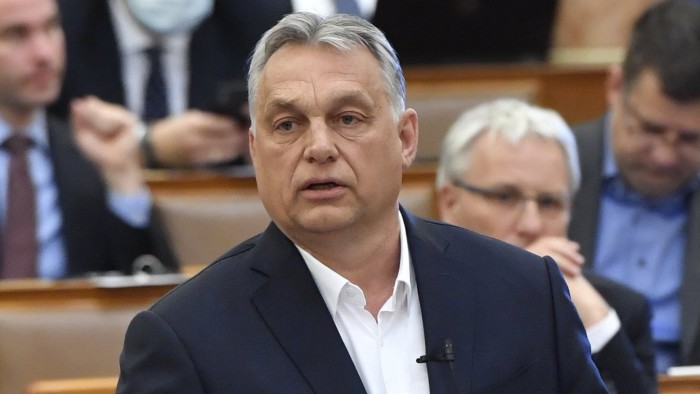Hungary is no longer a contestable democracy

Roula Khalaf, Editor of the FT, selects her favourite stories in this weekly newsletter.
Governments across the world are assuming emergency powers to contain the coronavirus pandemic. An exceptional danger to the public requires exceptional measures that inevitably impinge on individual freedoms and normal democratic processes. Such steps are legitimate if proportionate and temporary.
Unfortunately some strongmen leaders have spotted an opportunity, under the cover of a crisis, to tighten their grip on power and weaken any remaining checks put up by political opposition or critical media — none more so than Hungary’s nationalist leader Viktor Orban. On Monday, the Hungarian parliament, where Mr Orban’s Fidesz party has a two-thirds supermajority, enacted emergency powers that extend far beyond what is necessary even in these extraordinary circumstances.
The law, which allows for rule by decree, is open-ended. There is no sunset clause. Parliament could theoretically rescind the “state of danger” but not if it is unable to convene because of infection risk, real or perceived. In any case, it is fanciful to imagine Fidesz MPs defying their leader. Mr Orban declared a state of emergency over the migrant crisis in 2015. It is still in force.
The government is required to inform opposition parties about measures to fight the virus. That may count as oversight in Mr Orban’s book, but not in anyone else’s. The law also makes it a criminal offence punishable by up to three years in prison to spread a claim about the emergency that “alarms or agitates” a large group of people. It is a sweeping definition that could cow the few free media outlets left in Hungary as well as non-governmental organisations and academia.
Since returning to power in 2010, Mr Orban has systematically dismantled the country’s constitutional checks and balances, turning himself into a self-styled “illiberal democrat”. In truth, Hungary has ceased to be a fully contestable democracy even if its opposition parties have been reinvigorated in recent months.
That it should have come to this is an indictment of the EU, supposedly a community built on fundamental values. The EU’s instruments for keeping errant members in check are inadequate. The so-called Article 7 sanctions process which can end up in a member state losing its EU voting rights, is ineffective since another member can block it. Poland and Hungary have each other’s backs. A proposal to insert conditions on respect for the rule of law into EU budget negotiations has been watered down. A new annual check by Brussels of each EU country risks being toothless — although in this universal crisis it might show how much of an outlier Hungary has become. The biggest stick the European Commission can wield is to take Budapest to the European Court of Justice for infringing fundamental values. Court judgments tend to bring governments into line. If they defy them, capitals put themselves on the path to EU exit. But these cases can take time.
The EU’s failure is as much political as institutional. As a member, albeit suspended, of the centre-right European People’s party, Mr Orban has enjoyed political cover for his authoritarian breaches. EPP leaders, especially Germany’s Angela Merkel, should have called him out and kicked him out a long time ago. They still can. It would at least embolden those trying to hold him to account in Budapest.
The coronavirus emergency has superseded some of the EU’s most important policy achievements, such as open borders and the internal market. Now more than ever, it is values that are holding the union together. They must be respected.

Comments